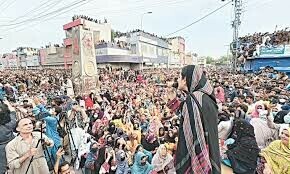HYDERABAD, Sept 20: The chairperson of the District Public Safety Commission, Masood Pervez, has proposed that annual confidential report of district police officers be written by the commission.
He was talking to Mohammad Mazhar Hussain, the regional director for the federal ministry of law, justice and human rights at his office on Sunday. He called for the empowerment of the safety commission set-up under the Police Order 2002.
The federal ministry official was informed by the DPSC chief that while the district police normally coordinated with the commission but it had been observed time and again that the recommendations of the DPSC had not been implemented.
Instead, he said, the policemen against whom action had been recommended were given comfortable postings in the district. He said the investigation wing of police had not disposed of any case as the cancel class considering reports of the DPSC but matters lingered on for unnecessary correspondences.
SP Fareed Jan Sarhandi said police officials of the investigation wing had no separate telephone connections for communication and vehicles for movement. He suggested that a monthly meeting between the DPO and the DPSC chief and the SP investigation be held regularly for solving complaints.
The ministry official noted complaints of prisoners and later discussed it with the commission chief who offered him that members of the business community would offer financial support to those who were languishing in jail for want of payment of fine. He said the judicial magistrate should sit in jail for hearing cases of prisoners because there was a shortage of prison vans.
ZAKAT: The joint secretary of the Federal Ministry of Religious Affairs, Zakat and Ushr, Mohammad Ilyas Dar, has stressed the need for fair distribution of zakat funds.
Talking to journalists at the Hyderabad Civil Hospital on Saturday after presiding over a meeting of a committee to assess the hospital's working before enhancing the zakat allocation on request of medical superintendent Dr Hadi Bux Jatoi, Mr Dar said members of local zakat councils could ensure that only deserving people received the funds by maintaining check and balance over chairmen of the councils.
The committee's other members were the Sindh secretary, Zakat and Ushr, Auqaf Hashim Leghari, and the assistant director-general, Federal Ministry of Health, Dr Syed Anwar Ahmad.
Mr Dar admitted that there were complaints of unfair distribution of the funds by local zakat council chairmen but a huge amount had been distributed among the deserving people.
He said there were 39,000 local zakat committees, 106 district zakat committees, one provincial zakat council and one central zakat council. He said it was the responsibility of zakat council chairmen to make correct assessment before distributing the funds.
The official said zakat was being distributed under different heads, including educational scholarships, hospitals, dowry allowance and Guzara allowance. He said the government had allocated Rs11 billion in the budget as zakat fund, 70 per cent of which went to needy people and distribution of the remaining amount remained questionable.
He said only the health sector received the funds directly from the central zakat committee, adding that 12 out of 13 government cancer hospitals, working under the Atomic Energy Commission, were getting zakat.
Mr Dar said this year Rs400 million had been earmarked for national level hospitals and in addition, six per cent funds were released by the provincial zakat council to hospitals in districts.














































Dear visitor, the comments section is undergoing an overhaul and will return soon.